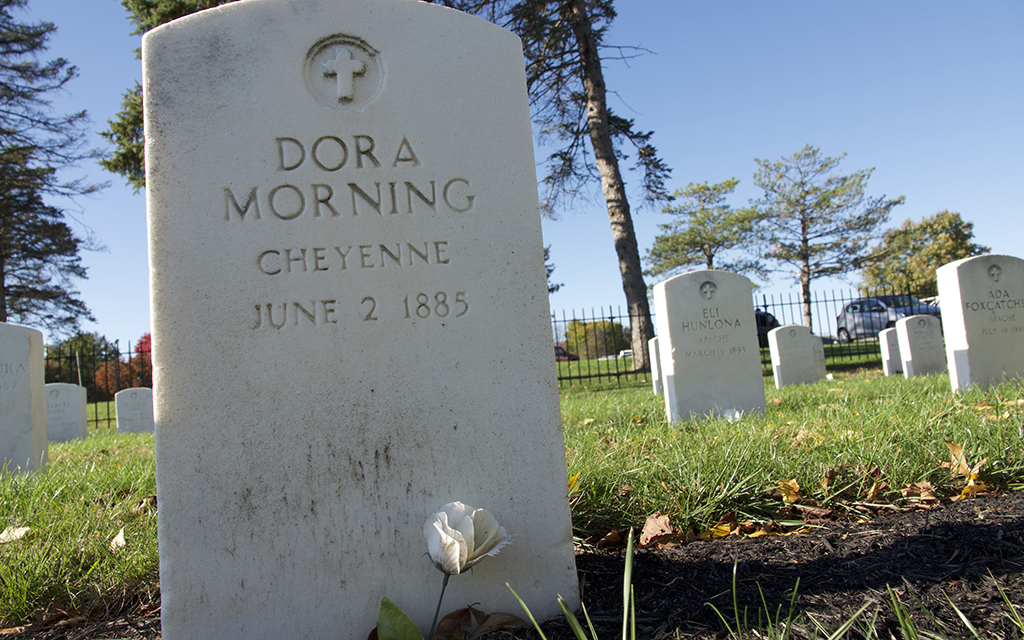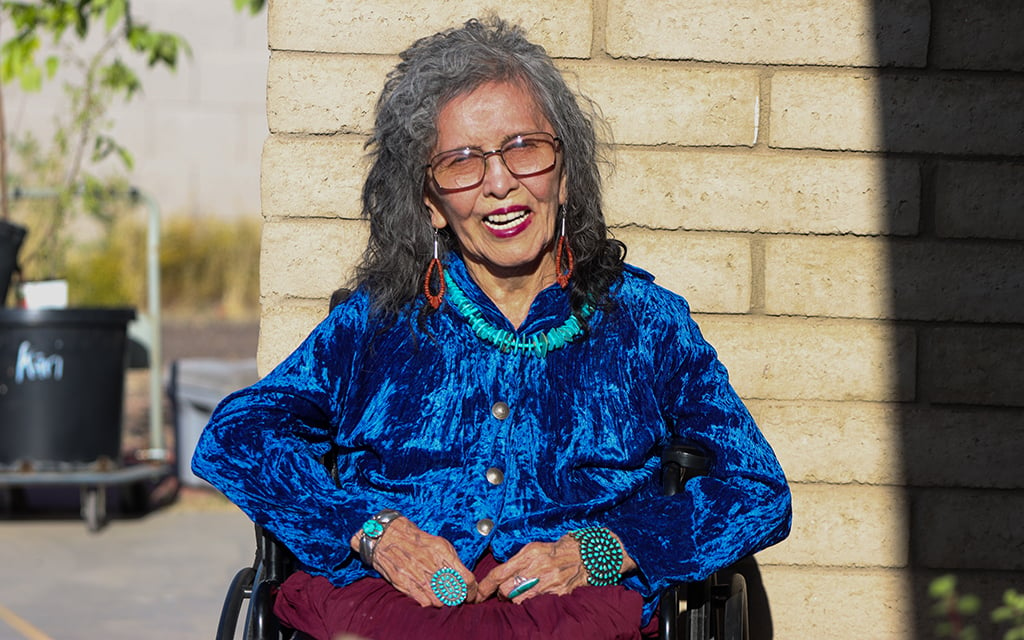
Dora Morning, a member of the Cheyenne Nation, is buried in the Carlisle Indian Cemetery on the former grounds of the Carlisle Indian Industrial School, where she died in 1885. The Carlisle Indian Industrial School sits on the grounds of the present-day U.S. Army War College. (Photo by Addison Kliewer/Gaylord News)
The U.S. Senate Committee on Indian Affairs has sent to the Senate legislation that would create the Truth and Healing Commission on Indian Boarding School Policies in the United States.
Oklahoma Sen. Markwayne Mullin, a Cherokee Nation citizen, was among the 10 other senators who make up the membership of the committee.
Mullin, who was absent for the majority of the hearing’s proceedings and when the final voting occurred, said he agreed with the decision to pass the bill.
“I support the bill. There is some work that needs to be done to it,” Mullin said. “We’re working with the chairman and the ranking member – everybody is working together.
“Even senator Warren is working, trying to improve some stuff,” he said referring to Democratic Massachusetts Sen. Elizabeth Warren.
The committee’s action came only two weeks after the Office of Army Cemeteries announced that the remains of five children who died at the Carlisle Indian Industrial School, a now-closed Pennsylvania boarding school for Native Americans, are going to be exhumed and returned to their families who have waited for their return for more than a century.
The children died between 1880 and 1910 while attending Carlisle, a government boarding school. The U.S. Department of Interior found in 2022 that Native Americans who attended school there were subject to physical and sexual abuse.
Carlisle was a talking point within a story about a child from St. Paul Island, Alaska, who died in 1906 and was repatriated in 2021, which came from Indian Affairs committee vice chair Sen. Lisa Murkowski, R-Alaska.
“(Sophia Tetoff) was sent to a boarding school in Pennsylvania – Carlisle Indian Industrial School – about 4,500 miles from her home,” Murkowski said to the members of the committee and those sitting in the committee room. “In these schools, children were forced to speak a language they didn’t know. Different clothing, different foods – all while living in fear that if they didn’t do exactly as they were told, there would be consequences.”
The proposed commission follows on the “Road to Healing” tour by Interior Secretary Deb Haaland. Haaland’s tour kicked off last July at the Riverside Indian School in Anadarko.
The legislation did not go without some changes as seven amendments were filed. Majority of those amendments came from senator Steve Daines, R–Mont., but Oklahoma’s Mullin proposed one amendment that was adopted.
It provided that the final report be publicly available on the website of the applicable agency. The legislation would have required the commission, the secretaries of interior, defense, education, and health and human services to hold two public meetings within each region within the Bureau of Indian Affairs that would be educational and present the findings of the commission.
The Bureau of Indian Affairs has two regions that cover Oklahoma – the Southern Plains and Eastern Oklahoma regions.
Gaylord News has reached out to Mullin about why he would strike the part of this legislation that would have public meetings for communities to hear about the findings of the commission, but the outlet has not heard back.
Mullin said there is still some work to be done before the legislation is complete, especially surrounding subpoena power.
“There is a lot of concerns about the subpoena authority,” Mullin said. “It’s pretty broad. We’re trying to bring it in and make sure there’s some type of accountability for the commission back to the committee itself so we have oversight over some of this stuff.”
Murkowski said that one of Daines’ amendments clears up some of the issues with the bill.
His amendment that focuses on the subpoena authority changes the amount of commission’s members needing to be in favor of a subpoena from three-fifths to needing unanimous consent.
Warren, who grew up in Norman and is a graduate of Northwest Classen High School in Oklahoma City, told the committee she supports the push back against the policies of Indian boarding schools that occurred more than a century ago.
“The federal government’s Indian boarding school policies caused unimaginable suffering and trauma that linger on in tribal communities today,” Warren said. “It is long overdue that the federal government fully reckon with this history and its legacy.”
Warren even gave a shout out to U.S. Rep. Sharice Davids, D-Kan., and Oklahoma U.S. Rep. Tom Cole, R-Moore, the co-chairs of the Native American caucus in the House of Representatives for their efforts of “carrying the baton in the House.”
The legislation surrounding the Truth and Healing Commission will now head to the Senate floor and Warren’s Senate office says they’re wanting to get the legislation through as soon as possible.
Gaylord News is a reporting project of the University of Oklahoma Gaylord College of Journalism and Mass Communication. For more stories by Gaylord News go to GaylordNews.net.
